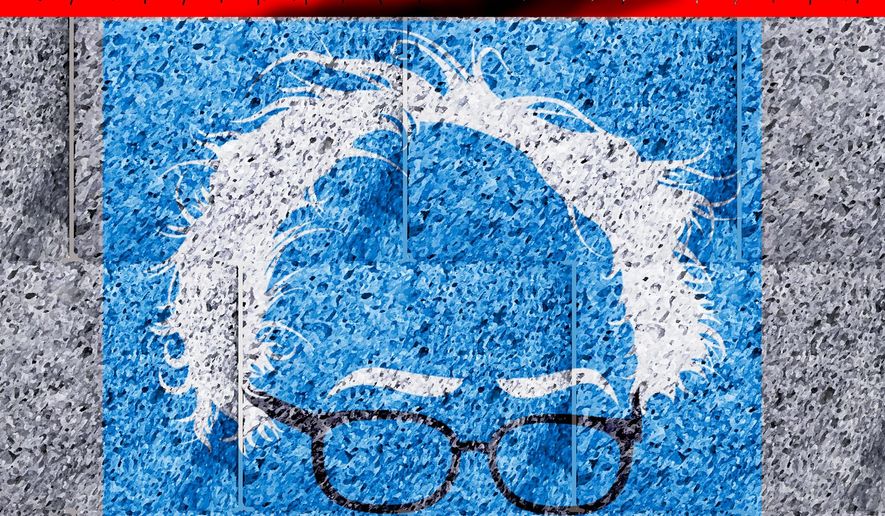OPINION:
While conservative headlines have seldom failed to lambaste Bernie Sanders for his unforgivable sympathies to Latin American-style socialism, the last several weeks have seen a disappointing shortage of coverage on the subject — at a time it would seem most appropriate.
In last month’s Democratic debate, Univision journalist Jorge Ramos confronted Sen. Sanders on the economic catastrophe in Venezuela, asking him to distinguish his “democratic socialism” from the policies plaguing the once-prosperous homeland of Simon Bolívar. In what proved to be a curious demonstration of both muffled exasperation and precalculated resolve, Mr. Sanders averred, “Let me be very clear: Anybody who does what [Nicolas] Maduro does is a vicious tyrant.”
The importance of this exchange appears to have gone painfully overlooked, however, by the media and the electorate alike. Make no mistake: Regarding Venezuela, Mr. Sanders cannot be let off the hook yet. Disavowing Mr. Maduro’s grisly legacy as the lackluster successor to Hugo Chavez (a rather fashionable trend on both the left and the right as of late) does not make one brave, nor does it exonerate Mr. Sanders for his 20 years of ambiguity on the Chavez-Maduro ascendancy.
From Venezuela to Vermont, empty promises and fervid affirmations that “this time will be different” have always been characteristic of would-be socialist regimes and their exponents. Chavez’s earliest promises — from his victorious 1998 campaign to his address at the 2005 World Forum — that his adaptation of socialism would eclipse the failures of the Soviet Union and North Korea are no exception.
During a historic 1998 interview between Mr. Ramos and Chavez, we find the soon-to-be Venezuelan president spewing what Mr. Ramos would rightfully identify as one of his most nefarious lies. After being asked whether he would “[nationalize] anything as president,” Chavez retorted, “No, absolutely nothing. We have even said we are willing to assist international private capital even more … .”
As the Chavez campaign surged to victory that year, Venezuelan headlines lauded Chavismo as “socialism for the 21st century” — a “third way” coalescence between capitalism and socialism. Fast forward to 2010, however, and El Commandante’s centrist sympathies appear to have atrophied. In an interview with BBC, Chavez discusses this reversal, concluding with what seems to be an overt allusion to democratic socialism: “Eleven years ago I was quite gullible … I even believed in a third way, I thought it was possible to put a human face on capitalism. But I was wrong. The only way to save the world is through socialism, but a socialism that exists within a democracy … .”
Then, just 14 months later, in what could only be described as either an astounding coincidence or an act of shameless sycophancy, the senator from Vermont would give his most frenzied endorsement of the Chavez regime yet, posting an op-ed to his official website asserting that “… the American dream is more apt to be realized in South America, in places such as Ecuador, Venezuela and Argentina … Who’s the banana republic now?”
Compare this with his more recent remarks, and the scenario of a Sanders at least partially inspired by Chavez becomes even less far-fetched. In an April 2019 CNN town tall, Mr. Sanders (in dazzling likeness with pre-2005 anti-Soviet Chavez) says, “What do I mean when I talk about democratic socialism? It certainly is not the authoritarian communism that existed in the Soviet Union and in other communist countries.” In another CNN interview two months later, the senator reiterates, “I have spent my whole life fighting for democracy … whether it was in the Soviet Union, Venezuela or anyplace else.”
And certainly not to be missed is Mr. Sanders’ widely criticized hiring of David Sirota, a known Chavez apologist, as his speechwriter in March 2019. Shortly following Chavez’s death in 2013, Mr. Sirota wrote a gleaming puff piece describing the dictator’s legacy as an “economic miracle.”
When Mr. Chavez took power, the people of Venezuela were not outraged or pessimistic; his victory was celebrated by millions. As earth-shattering as his election seemed, the conditions that laid the groundwork for it were gradual and subtle, beginning with the nationalization of the petroleum industry in the 1970s and culminating with Mr. Chavez’s eventual annihilation of the Venezuelan people’s most fundamental liberties from 1999 to 2013.
Now, in the face of such harrowing abuses across Venezuela today, from onerous bread lines to rampant police brutality to astronomical hyperinflation, we cannot afford to let politicians like Mr. Sanders — figures with such duplicitous sympathies to ruthless tyrants like Chavez and Mr. Maduro — infiltrate public policy here in the United States.
• Jose Nino is a Venezuelan-American freelance writer. Reed Cooley is the director of public relations at Young Americans for Liberty.




Please read our comment policy before commenting.